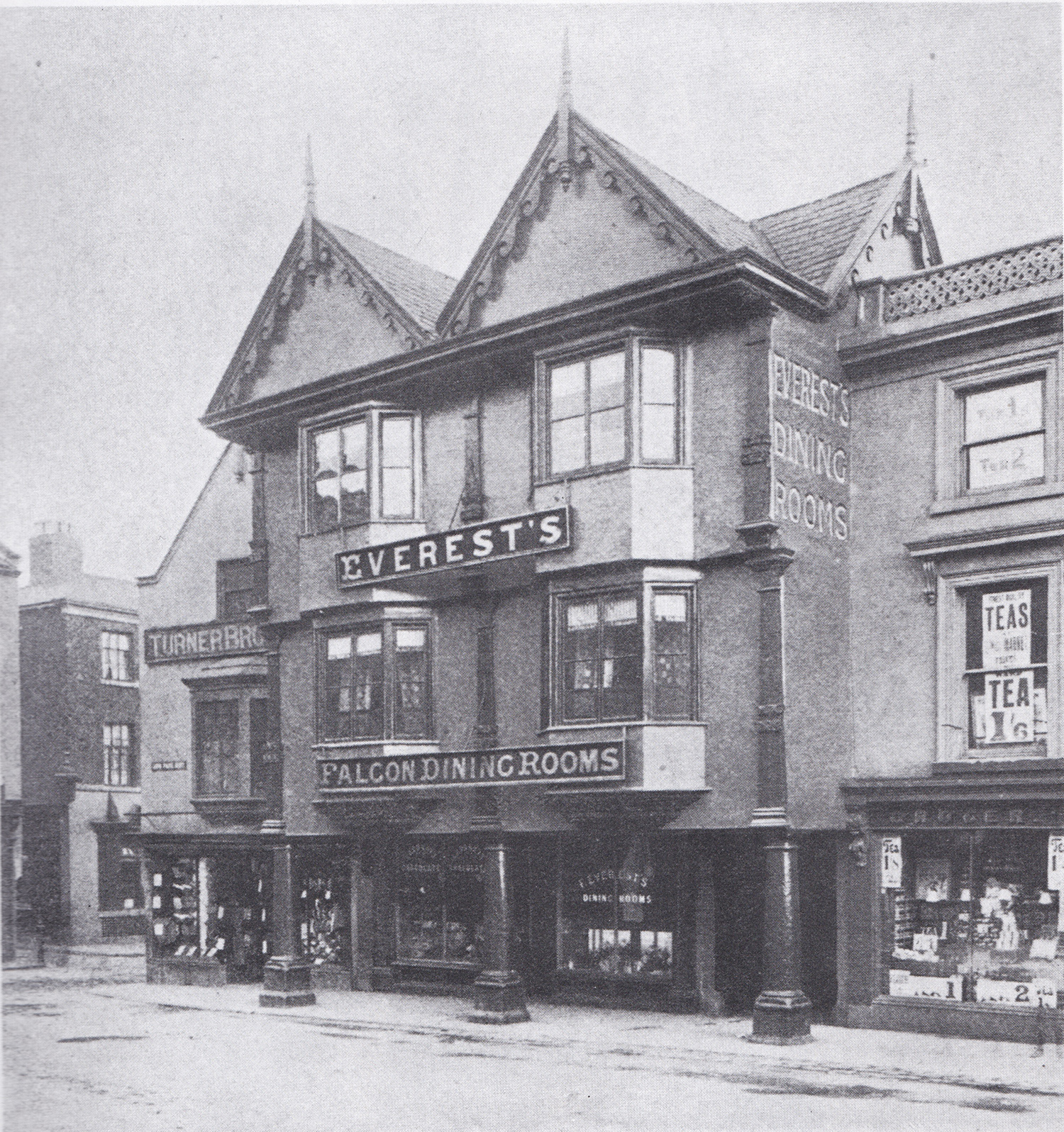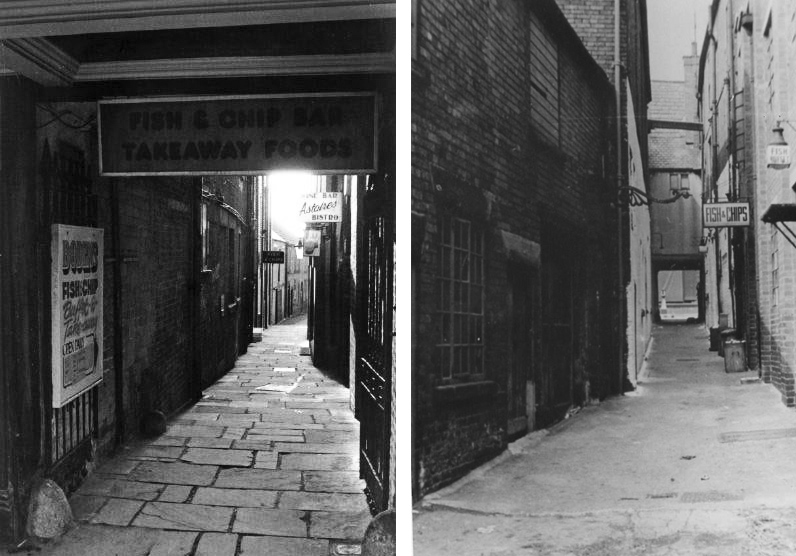
Built in the 16th century the Falcon Inn was originally a coaching inn at the eastern end of Low Pavement – in the image above we can see the entrance to Falcon Yard behind the first of the three columns.
Later, the building became Everest’s Falcon Dining Rooms, advertising:
Caterers for Wedding Breakfasts, Dinner Parties, Cold Luncheons, Suppers, Balls, Teas and Picnic Parties. All arrangements made for Outdoor Catering.
DINING ROOM, suitable for the accommodation of Large Parties.
Restaurant at Popular Prices. Bass’, Allsopp’s, and other Beers on draught and in bottle. Carefully selected Wines. All Table Requisites are let on Hire.
To the left Turner Bros shop can be seen and on the extreme left is the Commercial Hotel.
But to many people from Chesterfield it will always be Bodens – the best fish and chips in town!

Falcon Yard Fire
“Falcon Yard narrowly escaped destruction by fire on January 3rd 1867. On a bitterly cold winter’s night, as the youths of Chesterfield returned from the ice-covered pond in Stephenson’s Park, jingling their skates as they ran, they saw a rude, red glow in the sky, and, hurrying towards Low Pavement, they found the premises of Mr. Wilson, the grocer, on fire.
The flames, bursting out of the warehouse, stretched their hot, scorching tongues across the narrow yard, and licked the side of Mr. John Walton’s former residence, as if they would devour it too. The firemen worked with skill and heroism; but the flames extended, and the sleeping rooms near the shop became cauldrons of thick overpowering smoke, against which the flames lapped fiercely. The figures of anxious men and women moved restlessly on the pavement, now in the dark shadow, and then in the dazzling glow caused by the fire.
Amid the sounds of falling glass and crackling timber, and the thud, thud of the fire-engine, a great fear came over the crowd. “Oh God!” shouted an agonised voice, “There are children in the house.” Who would save them? As if by magic a tall ladder reared its thin length to the chamber windows. Nimbly up the rungs stepped the lithe form of “Dick” Maw, careless of the blinding smoke, and the hot breath the spreading flames sent forth, in his eagerness to save the little children’s lives. Brave “Dare-devil Dick!” Many a mother’s prayer for his safety was uttered, as he disappeared within the smoke shrouded rooms, where dense, grey vapours twined about, like serpents intent upon their prey. Well-nigh overpowered with smoke and heat “Dick” groped about on his noble errand. Outside, every moment seemed like an hour. The suspense was painful. Was he able to save them? With begrimed face and scorched clothing, he fought his way to one of the windows, with a human being held securely in his strong arms; and, eventually, all were saved without a scratch – except for the servant, who, panic-stricken, took a frantic leap into the roadway, and suffered for it.
Meanwhile a huge barrier of flame stretched across the yard; and through the flames dashed brave men, like Charles Rollinson, in their anxiety to save life and property. Mr. Walton’s premises were in imminent danger, and his children were removed to a place of safety. Fiercer and fiercer the fire raged; but it had to fight against men of stern resolve and undaunted hearts, and at last gave up the struggle. It was curbed at midnight, and at dawn had been utterly snuffed out, without seriously ravaging the old Falcon buildings, although it had almost gutted Mr. Wilson’s warehouse, and a part of his dwelling.
When daylight came, hundreds of citizens came also to see the havoc the flames had made, and they found themselves in a nasty dilemma as they made their way through the warm, sticky stream of treacle and sugar that flowed slowly down the yard towards the bakehouse that has so long been illumined with genial “Doboy’s” wit.”
Old and New Chesterfield by Tatler.
Murder!
The Shambles have a morbid interest too, for those who like to read of crime. In a curious old shop – now demolished – near the Packers Row outlet, a murder was committed on Sunday night, December 7th, 1845. John Platts, owing money to George Collis, enticed his creditor into the shed which he used as a butcher’s shop, attacked him with a spade and killed him in the presence of Morley, a confederate. The noise made in the shed, usually deserted on Sunday night, attracted attention, and there was knocking, and a shout “ Who’s there?” “Nobody,” replied Platts, unfastening the door, and coming out of the shop in a gleam of light. “ He’s got his sweetheart inside,” remarked one of the curious group, laughing; but Platts, taking the loiterers into his confidence, said ; “ No, Hannah has gone to Church.” Then he coolly returned to his victim, to ponder how he could secrete the body; and the next day, in reply to the inquiry “ Where’s Collis ? ” said he had gone to Manchester.
The finding of the remains in a sack, in a cesspool, at the bottom of Bunting’s Yard, the discovery of parts of the body beneath the refuse eight months afterwards, and the arrest, trial, sentence to death, and execution of John Platts for the murder were dramatic incidents that have thrilled many in the telling. The watch and boots belonging to George Collis were found in the possession of a member of the Platts family, and a pocket handkerchief bearing the initials “ G C,” worked by his sweetheart, was discovered with the remains of the murdered man, and at Derby Assizes there remained no doubt in the judge’s mind, as he assumed the black cap, that John Platts had committed the atrocious deed, inasmuch as he said, in passing sentence :
“It is a sad spectacle indeed—a very dreadful offence. You are said to have been, when younger, a person of good character ; and one is at a loss to discover what was the real motive for the dreadful deed. That is only known to the Almighty, who is the searcher of all hearts. I can only trust that you are really sensible of the enormity of the crime, and hope that yon are really repentant of it.”
Yet Platts, in his confession, maintained that Morley was the murderer, and that he wheeled the body in a barrow to the cesspool in Bunting’s Yard. Other folks believed, after Platts had paid penalty with his life for the crime, that he was innocent. Anyhow, Morley died a horrible death in delirium; and Antony Lant and Bob Statham, also suspected of complicity in the tragedy, went to the dogs, and dragged out remorseful lives !
Modern Chesterfield – John Pendleton & William Jacques 1908
“Men I Have Known” & The Falcon Yard
I recollect reading reading an article, “Men I have known.” There was a tinge of pathos in the title, for it spoke of friendship severed by death, and of “the pain there is in parting.”
Sauntering along the Low Pavement, soon after the shop-boys have taken down the shutters, I see with my mind’s eye the wide causeway thronged with people, who will never tread its flags again.
James Lingard, with spectacles on nose, is looking severely over his black stock out of his tea shop. William Bingham, with his broad-brim, and methodical walk, is striding towards the post office.
Matthew Dobbs, a real Boniface, stout as Daniel Lambert, leans on his stick, at the top of the Three Tuns yard. William Wordsworth, who loved his glass and song, comes limping along gaily, notwithstanding the fearful twinges that are rioting in his gouty leg.
Charles Haslam, in his big white apron, gives one pleasant greeting as he turns down the Falcon yard, and there beams on his genial face the gratifying reflection, “I am saucemaker to the Queen.” Cooper, the printer, and parish clerk, is offering a pinch of snuff to one of his customers. Joseph Bettison, the druggist, with his strangely-shaped grey cap, crosses the road from the Shambles, a dapper, quiet little gentleman, who scarcely speaks above a whisper.
Stately EG Maynard rides by in his scarlet coat, on his way to the hunting-field. Bluff Captain Wood, with his nautical stories, and hearty sea-dog voice, gossips with his many friends, in language strong and maritime. Arch-deacon Hill, whose life is as spotless and pure as his own white kerchief, steps out of his brougham to give some poor creature a kindly word, and proffer material help.
Daniel, the chemist, who has a kindly heart, although he speaks like “Jingle,” “Sam Weeler’s” erratic enemy, dodges about behind his counter, amusing his customers with his singular expression, “Thank you, sir. Yes, sir, mum; yes, mum, sir.”
These, and many other familiar figures, have done with this world’s troubles, and entered the silent land. The signboards on the Low Pavement are gradually changing; many old houses have been effaced; but the men who bore them are not yet forgotten.
The shops and long yards that skirt this broad business-way have altered, as wen as the inhabitants. At the South Street corner of the Low Pavement, Charles Haslam. had a quaint, bow-windowed, confectioner’s shop. The large shop under the piazzas was formerly Whitehead’s flour store – noted for a burglary that never took place. Previously – years previously – it was a portion of the Falcon Inn, a fine old English hostelry, with big, heavily-raftered rooms, and gigantic fireplaces, and thick draperies of Yorkshire cloth to keep out the cold.
The Falcon Yard has been the scene of comedy, as well as tragedy. On it west side stands the old Assembly Room, recently a printing-office. Here a very impudent trick was once played upon a too-confiding public. An adventurer placarded the town with posters, advertising an entertainment of unusual excellence. Entertainments were scarce; tickets were bought readily; the night came; the Assembly Room was crowded; the hour arrived for the commencement of the performance; but the platform remained deserted. The audience stamped, and shouted, and whistled; but the talented artistes did not come. Indeed, there were none about. The whole thing was a hoax, and by the time it was discovered, the adventurer, with the ticket receipts in his pocket, was scudding across the fields, supremely indifferent to the rage of those he had basely hoodwinked. The “entertainment’’ provoked both wrath and mirth; but it was dangerous to ask anybody how they enjoyed it. The mirth was a privilege confined to the citizens who had not purchased tickets!
Old & New Chesterfield by Tatler

You must log in to post a comment.